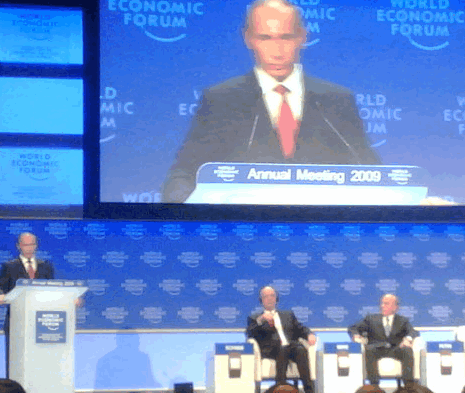 Shortly before the World Economic Forum (WEF) started on Wednesday in Davos, Switzerland, WEF published its Agenda 2009. Economic turmoil, wars and poverty all feature prominently, but will delegates move forward on finding possible solutions to important issues raised in this document?
Shortly before the World Economic Forum (WEF) started on Wednesday in Davos, Switzerland, WEF published its Agenda 2009. Economic turmoil, wars and poverty all feature prominently, but will delegates move forward on finding possible solutions to important issues raised in this document?
We previously informed you about the World Economic Forum in such postings as:
In recent years, WEF has promoted the idea that a cocktail of innovation, globalization and free-market capitalism will deliver a better world. Unfortunately, with the financial crisis upon us, delegates’ confidence in those ideals has been shattered.
However, people watching from afar still tweet things like:
We wanted a bit more fodder and asked a few people. Jim Goodnight was the first to respond via his UK PR pro Sheila Parry:
We got an answer:
Find more answers at our Twitter feed for Davos ![]() WEFdavos . Nonetheless, we are still waiting for answers to tweets like:
WEFdavos . Nonetheless, we are still waiting for answers to tweets like:
Where is the challenge
While economic turmoil, wars, poverty and so forth are all on the agenda and the crisis talks moved to Davos, there are some things we should keep in mind when absorbing information from the WEF:
- Gillian Tett: “So much of the current battle is not just about the tangible numbers, it is about psychology, and sentiment, and that is very fluid and potentially quite fragile in many sectors,” (FT Guide to Davos 2008-01-27, pp. 7-8).
Lucy Kellaway: “Too much childishness has also been banished at Davos. The Swiss resort will this week be a martyr to some of the least attractive traits of adulthood: self-importance, long-windedness and the ability to sit through politically correct sessions on corporate social responsibility without fidgeting,” (Lucy Kellaway, FT 2008-01-26, p. 12).
Thomas Cooley: “The modern business corporation is one of the most important and complex drivers of economic and social change in the world. At the highest level, it demands the serious study that only thorough research can provide.
Anecdotal approaches can take one only so far. Serious analysis of ‘why to’ and ‘why not’ questions needs to drive the decisions and choices that shape the global economy,” (Thomas Cooley, FT 2008-01-27, Business Education p. 5).
Hence, comparing notes on what one may need do to emerge from a serious crisis is unlikely to provide the world’s elite with answers to questions such as
- a) why regulate financial markets this way? or
b) why not regulate markets another way?
These are questions that must be asked in order to develop and implement better regulation for banks and other financial institutions. Will sessions in Davos address “Ponzi” schemes and other financial scams coming to light in recent weeks? Ponzi schemes, or pyramid schemes with slight variations, effectively “rob Lisa to pay Lucy”. Early investors at the top of the Bernard Madoff pyramid (an alleged US$50 billion “Ponzi” scheme) are paid off with money from new investors at the bottom, requiring a constant search for new investors.
Daimler, Bosch, Thyssen-Krupp, Renault and so forth are making use of government-financed schemes to help fund lay-offs and cut hours. We need real answers to resolve this crisis and so far I am not hearing anything that suggests we are getting there with the help of the World Economic Forum (WEF).
South Africa’s finance minister Trevor Manuel put a name to this trend:
Bottom line
Numbers are up this year. 2600 attendees including 1,460 business leaders are expected to attend the WEF. Some insinuate that this is because they hope to influence and shape Agenda 2009. Others claim that the current financial crisis has left many business, government and non-profit leaders in search of an intellectual compass. However, given the more than 220 sessions which cover a vast array of topics and issues, it is not certain whether Davos will provide much direction.
 In fact, some business leaders and policy makers have admitted that they are attending Davos in hopes of expanding their influence.
In fact, some business leaders and policy makers have admitted that they are attending Davos in hopes of expanding their influence.
It is also doubtful that people like John Thain will not return to attend Davos in their capacity as CEO of another body in the future. Mr. Thain is reimbursing the €915,000 that he authorized to redecorate his New York office at Merrill Lynch in October/November 2007. But what is worse is the fact that Mr. Thain felt it was justified since the expenditures were made “in a very different environment”. While this may be true, it still does not seem just to spend so much for an office while talking about fighting poverty and environmental disasters in Davos.
If the Citibank example does not suggest that little has changed, what will? Put differently, will talking about poverty and wars in Davos reduce the chances of having CEOs redecorate their offices so outlandishly from now on as John Thain did? You be the judge.
I am aware of only one other who followed this laudable example:
As well, car parts makers Conti and Schaeffler are now in state bail-out talks because they are laboring under €22 billion in debts. Unfortunately, this has much more to do with owners’ and board members’ greed and egos than sound management practice. Put differently, talking about the environment is wonderful but questionable considering WEF’s CO2 footprint and its VIPs being ferried about by Audi limousines or helicopters to Davos. Using the public transport system would have been more responsible… It all sounds so hollow. Talk is cheap… put your money where your mouth is.
The only hope left for the rest of the meeting’s duration seems to be some reckoning, contrition, and large helpings of humble pie for delegates. But this 2008-01-27 tweet from the WEF’s own Twitter channel does not suggest this will happen:
![]() davos #Davos is more relevant than ever before! This historic meeting will generate ideas on how to get out of the global economic crisis.
davos #Davos is more relevant than ever before! This historic meeting will generate ideas on how to get out of the global economic crisis.
It may be relevant but will the ideas culminate in practical solutions that benefit all people around the globe or just the elites that attend Davos? And to answer our title, Davos may generate many ideas but few, if any, will improve the lives of those who lack drinking water and suffer wars and droughts.
=========>
Here’s what I’m suggesting for today. What is your take? As a participant in the World Economic Forum (WEF) in Davos, Switzerland,
1) what objectives did you set yourself, and, as importantly,
2) what are you doing about achieving these objectives whilst attending WEF?
Please write a comment on the above or any other issue you want to talk about and share your important insights with us below.
And if you want the real story, follow WEFdavos to get the scoop. Thanks for your support.
=========>

Pingback: World Economic Forum
Pingback: World Economic Forum